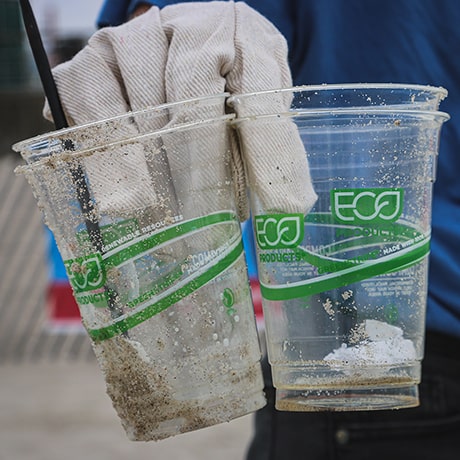Never before Corporate Social Responsibility has been so relevant, with companies accused of greenwashing risking to see their revenues collapse. This is because new generations are increasingly concerned about creating a more sustainable future.
In this article, you will learn how to avoid greenwashing and why everyone is talking about corporate social responsibility (CSR). Keep on reading ‘When Corporate Social Responsibility Goes Bad: Greenwashing’ to become an expert on sustainability matters.
Is Corporate Social Responsibility Important?
The demand for businesses with a social impact has soared in the last years. Millennials and Gen Z put particular emphasis on purchasing and working for businesses with ethical principles.
As highlighted in a survey by McKinsey: “Seventy percent of our respondents say they try to purchase products from companies they consider ethical. About 65 percent try to learn the origins of anything they buy—where it is made, what it is made from, and how it is made.”
This affects organizations in two ways. On the one hand, companies can increase their sales by giving people the ethical responsibility they demand. On the other, organizations have higher chances to attract, motivate and retain talent. Research show that employee are interested in working for a business with a real positive impact on society.
Furthermore, studies have proved the economic benefit of being sustainable, as businesses can reduce their costs. For example, in Barcelona, the government has saved around 49 million on water costs through smart IoT deployment strategies.
What is Corporate Social Responsibility
Although CSR has become mainstream only in the last decades, the concept has been around for over 50 years. Its official history trace back to 1953, when Howard Bowen, an American economist, coined the term.
But what is corporate social responsibility? According to The United Nations Industrial Development Organization (UNIDO), CSR is: “a management concept whereby companies integrate social and environmental concerns in their business operations and interactions with their stakeholders.”
In other words, CSR activities focus on fostering positive change in society and the environment while increasing profits. Usually, companies have developed corporate social responsibility around one or more of the following areas:
– Philanthropic and Volunteering CSR activities
In philanthropic actions, the focus is on donating money to grant people from disadvantaged backgrounds access to services. For example, Oprah Winfrey, one of the most powerful people in the world according to Forbes, runs the ´Oprah Winfrey Charitable Organization’. Since 2010, the charity has donated 400 million dollars to empower women and children throughout the world.
In volunteering activities, employees use their time to generate a positive change. The consulting firm EY is the perfect example. Since 2010, EY -one of the most prestigious accounting firms- holds EY Connect Day, an event in which employees use their time to strengthen communities. They do so by focusing on teaching entrepreneurial business skills and advance environmental sustainability.
One of the main perks of volunteering initiatives is that they reach three goals at the same time: firstly, communities feel empowered, secondly, employees feel more engaged and motivated to work for a company with a tangible social impact. Thirdly, if done correctly -as in the case of EY- companies can bolster their image.
– CSR and Ethical Labor Practices
Over the last years, companies have understood that it is not enough to occasionally run philanthropic or volunteering activities. It is a good gesture to alleviate social problems, but it falls shorts of addressing them.
Instead, people want to see companies committing full time to be ethical, starting from their workforce. For example, it means fostering a safe, diverse and inclusive workplace.
As we have highlighted in ‘7 Actions to Promote Diversity and Inclusion in the Workplace, it has become a common practice for leading companies like Slack and Microsoft to publish reports on the state of diversity of their workforce. In this way, everyone can see if they have made progress on their inclusion efforts, and if not, they can be held accountable. Moreover, by making the information public, they can also highlight the different initiatives they have in place.
Businesses that manage to successfully adapt to the needs of new generations are bound to thrive. Research published in the Harvard Business Review shows that companies with higher-than-average diversity had 19% higher innovation revenues. Plus, as previously mentioned, it will mark the difference between a company where employees want to work and a corporation people want to leave. Last but not least, these new concepts bring new job opportunities: In 2020, the demand for workplace diversity experts saw a 64% increase.
– CSR and Environmental Responsibility
One of the most pressuring concerns of our times is fighting climate change. According to the biggest ever opinion poll on climate change, two-thirds of people think climate change is a “global emergency”. The poll was conducted by the UN Development Program and surveyed 1.2 million people from 50 countries in the world. What appears clear from the poll is that people -and younger generations especially- want concrete actions to tackle one of the biggest issues of our century.
Some companies have used the World Earth Day to show their dedication to the protection of the planet. Hootsuite announced its partnership with Green Standards to turn corporate waste into donations and planting of 1,502 trees. While IBM has publicly committed to achieving net-zero greenhouse gas emission by 2030 and procuring 75% of their electricity from renewable sources by 2025.
Other companies have made sustainability a core value of their work. A remarkable example is the fashion brand Benetton. It has historically been a great advocate of a sustainable fashion industry. Before it became a trend, Benetton was already educating consumers on the importance of prolonging the life of clothes.
When Corporate Social Responsibility (CSR) Goes Bad: Greenwashing
As we have seen so far, organizations are increasingly interested in presenting themselves as sustainable. It will bolster their image and, in turn, increase their profits. But companies don’t always practice what they preach and rely heavily on publicity stunts where environmental responsibility is just a facade. The practice has unfortunately become so popular that has led to the creation of the term “greenwashing”.
This strategy might seem like a good option to attract more consumers in the short term. However, in the long-term, it will backfire. Companies that communicate something that they are not faces backlashes from the community, with “about 80 percent of consumers refusing to buy goods from companies involved in scandals.”
It was clearly the case for companies like Shell, Ryanair, or BMW. They have been accused of greenwashing and their ads have been banned due to misleading environmental claims. In 2008, Shell defined the world’s largest oil refinery as “sustainable”. In 2017 it was the turn of BMW, which falsely claimed in an ad that their new car was “zero emissions”. Finally, in 2020, Ryanair used outdated information to claim its commitment to the environment.
Even worse was the case of Walmart that, back in 2017, paid $1 million to settle greenwashing claims that alleged the company was selling plastics misleadingly promoted as environmentally friendly.
When Corporate Social Responsibility (CSR) Goes Bad: from Greenwashing to Pinkwashing
As diversity, inclusion and ethical labor practices have become an essential element for new generations, so has the need for corporations to depict themselves as a safe haven for everyone. For example, the term ‘pinkwashing’ refers to those organizations accused of presenting themselves as falsely LGBT+ friendly.
Apart from pinkwashing, there is a history of corporations seeking to present themselves as promoters of values like gender equality, anti-racism and so forth.
A famous example was the ad run by Pepsi starring Kendall Jenner. The company tried to jump on the Black Lives Matter movement started to stop police brutality. However, things didn’t go as expected. The ad quickly became a viral meme and -due to intense backlash- Pepsi was forced to pull the ad from the internet less than 24 hours later. Even worse, the company suffered a stark decline in credibility.
Our Tips to Nail Corporate Social Responsibility and Avoid Greenwashing
Be honest
It might sound obvious but -for us- it is all about being honest. Organizations should never communicate something that they are not. It is preferable to admit openly and transparently how or if they take a stand on social and climate justice. If they don’t have any initiative in place yet, they should communicate how they intend to tackle those issues. People appreciate when companies make a genuine effort to do better.
Measure your impact
Organizations should keep track of the social and environmental impact of their CSR activities. It will help them to understand if they are performing as expected and it will reduce the risk of greenwashing. Furthermore, by measuring and making public their impact, companies can generate more trust.
Learn from others
Companies can also learn from other organizations how to go beyond the concept of CSR and become a 100% ethical business. As we will see now, there is one brand in particular that represents the future of corporate social responsibility.
The Future of CSR: Patagonia
Patagonia is probably the best example to show how companies can give new generations what they want while increasing their revenue. Founded in 1973 by Yvon Chouinard, the sports brand aims at revolutionizing the fashion industry, making it more ethical and sustainable. For Patagonia, transparency and being authentic are at the core of how they do their ethical business.
The company publishes detailed information on facilities and suppliers across its supply chain, so it can prove its commitment to sustainability and consumers can make informed decisions. Moreover, Patagonia continually invests in new technologies to reduce its environmental impact.
Additionally, to guarantee they hold themselves to the highest environmental and social standards, they participate in several programs and certifications: Fair Trade, Fair Labor Association® and Regenerative Organic Certified™ Pilot Programs, just to name a few.
The diversity of programs and certifications in which Patagonia participates ensure that the brand is coherent with its social impact mission, combining the respect for the environment with a strong positive impact on employees and communities.
Its activism has proved to pay off. It is often cited as a best practice on sustainable matters. At the same time, the company makes considerable profits, with sales of about $1 billion per year. This is because Patagonia’s message deeply resonates with its target audience. As Emy Demkes wrote in her article: “the harder the company fights against the consumer society, the bigger its business grows.”
Towards a more sustainable future
The main lesson we can learn from ‘When Corporate Social Responsibility Goes Bad: Greenwashing’ is that we all have a role to play in creating a better future in which we can meet our needs without compromising those of the generations to come. As consumers and employees, we can demand to governments and organizations to do better to save our planet. It’s not about communicating something that companies are not, as with greenwashing, it’s about demanding actions with a real impact.
You can learn more on the topic of business with a social impact on our upcoming e-book ‘What is social responsibility in business and why you should care about it’.



